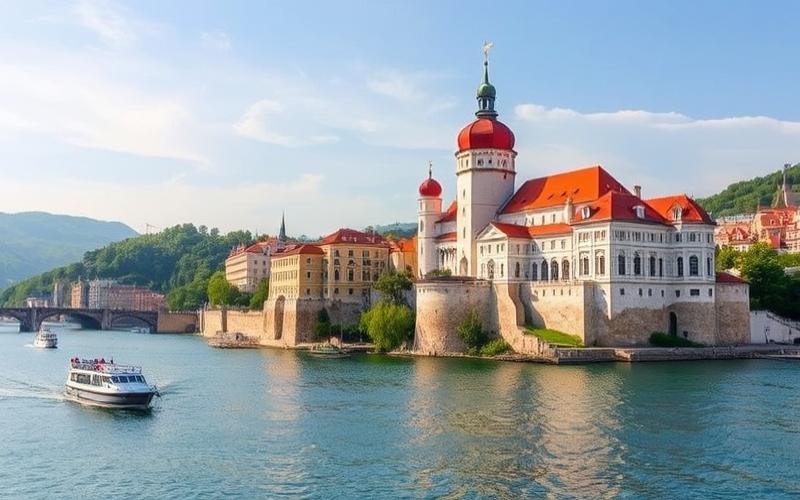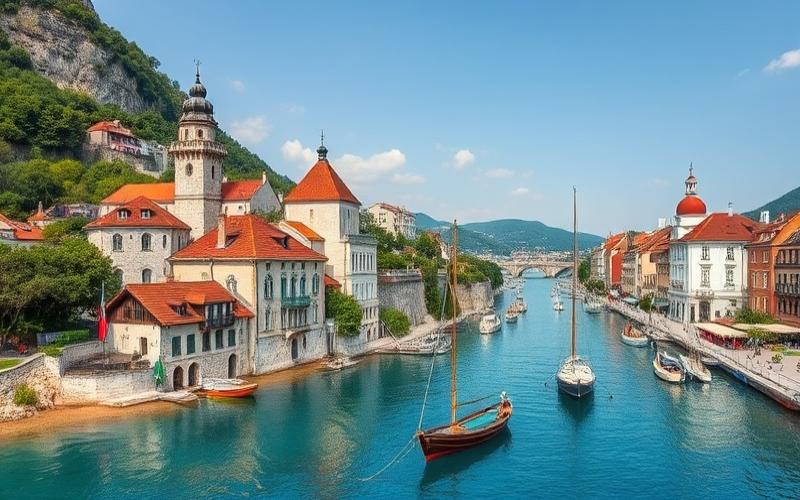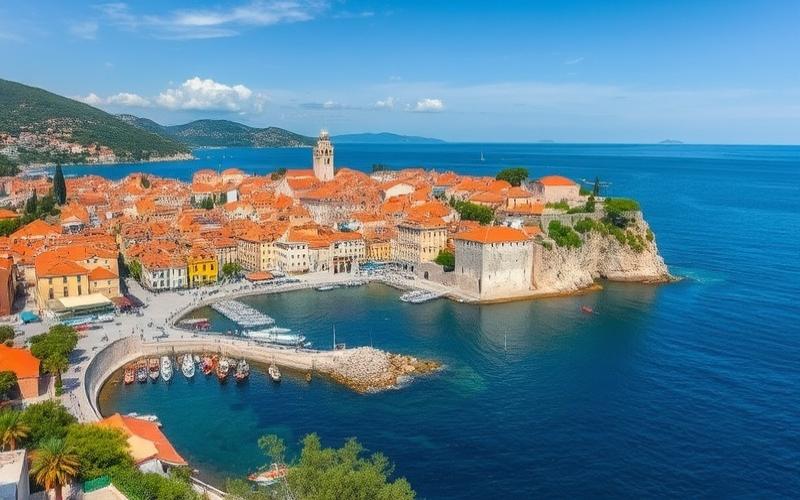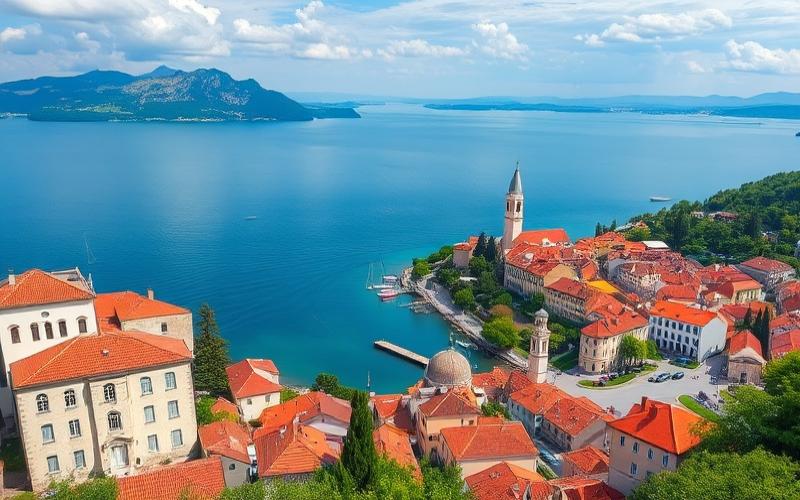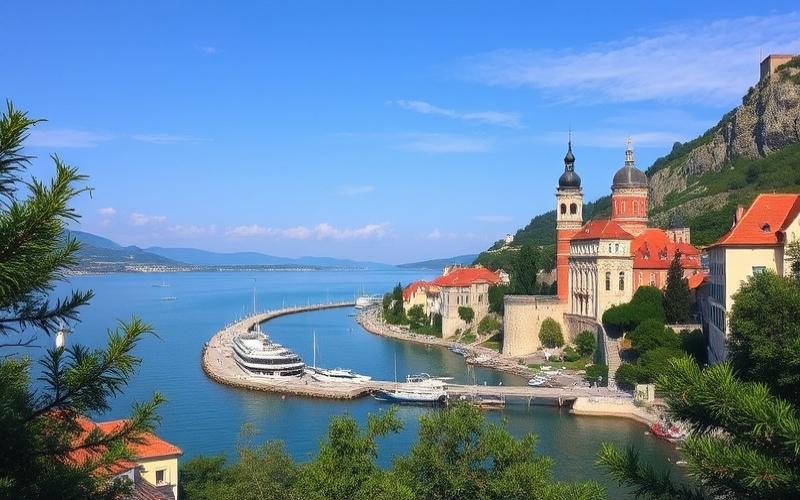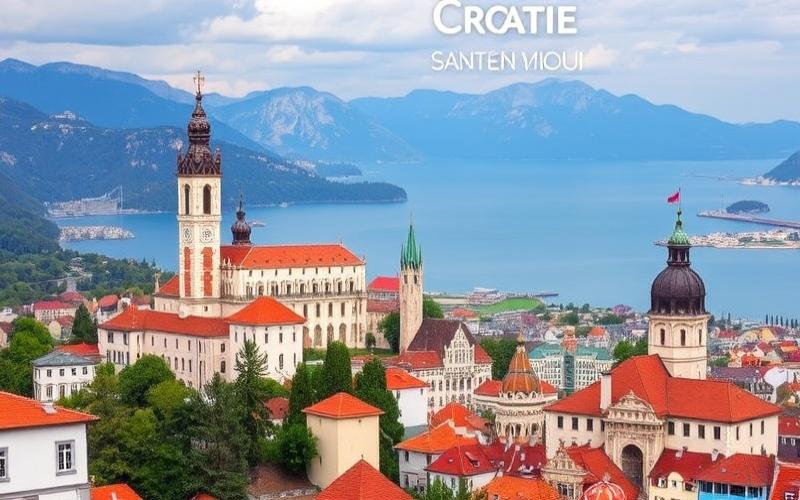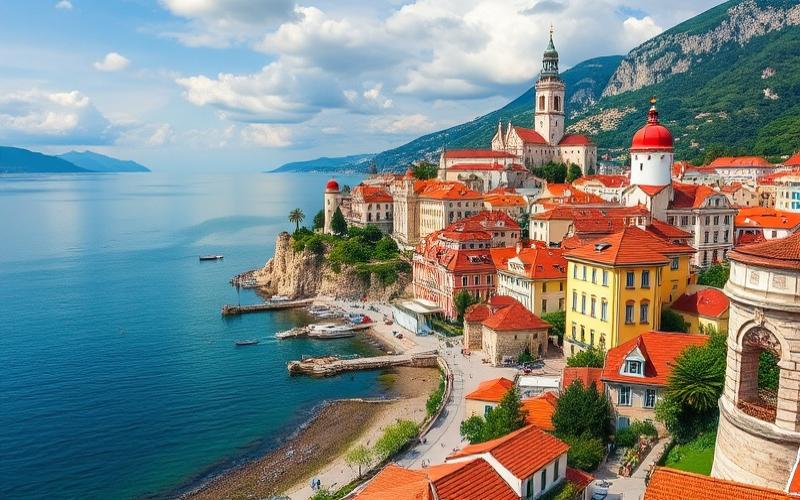
 Published on and written by Cyril Jarnias
Published on and written by Cyril Jarnias
Moving to Croatia, a country with a rich cultural heritage and breathtaking landscapes, is an exciting adventure for many expatriates. However, one of the major challenges they may face involves access to healthcare. Understanding the Croatian healthcare system, its specific features, and the options available for expatriates is essential for living peacefully in this captivating country.
This article explores in depth how to adapt to this system, the costs to anticipate, and the importance of subscribing to suitable health insurance to ensure a hassle-free medical experience. Dive in with us to discover everything you need to know to fully enjoy your stay in Croatia while taking care of your health.
Accessing Quality Healthcare in Croatia
Healthcare Facilities Accessible to Expatriates in Croatia
- Public Hospitals: present in all major cities, accessible through the mandatory health insurance system HZZO. They cover most routine and emergency care.
- Private Clinics: mainly located in urban centers, they offer specialized services and are often preferred by expatriates and the affluent population for quick service and comfort.
- Medical Offices and Local Health Centers: for general medicine and some specialized care.
Quality of Care and Infrastructure Level
- Public hospitals have adequate infrastructure but may suffer from wait times and sometimes less modern equipment compared to Western Europe.
- Private clinics generally offer superior quality, newer equipment, and faster service.
- Routine medical care is affordable, but hospitalizations or specialized procedures can be costly in the private sector.
- Croatia regularly invests in modernizing its infrastructure, but the level remains uneven across regions.
Languages Spoken by Medical Staff
- The primary language is Croatian.
- In major cities and private facilities, it is common to find doctors and medical staff who speak English.
- English proficiency varies in the public sector, but expatriates report that communication in English is generally possible for essential care.
Health Insurance System and Access for Expatriates
- Public System: all residents must register with HZZO (Croatian Health Insurance Fund), which provides basic coverage.
- Private Options: international mutuals, supplementary contracts with CFE (Caisse des Français de l’Étranger), or first-euro insurance (immediate coverage without coordination with a basic plan).
- European expatriates can use the European Health Insurance Card for temporary stays and urgent care.
- Non-European expatriates must provide proof of private insurance covering medical care and repatriation to obtain their residence permit.
Steps and Administrative Procedures to Access Care
- Obtain a visa or residence permit from local authorities (for stays over 90 days).
- Register with HZZO to benefit from Croatian social security, providing civil status documents and, if applicable, specific European forms.
- Subscribe to supplementary international health insurance (highly recommended for access to the private sector and repatriation).
- Present your European Health Insurance Card (for EU nationals) upon admission to a hospital or clinic.
Comparison with Other European Countries
| Country | Public Coverage | Private Access | Infrastructure Quality | Languages Spoken |
|---|---|---|---|---|
| Croatia | Universal (HZZO) | Private Insurance | Adequate, Uneven | Croatian, English |
| France | Universal (CPAM) | Private Mutuals | Very High | French, English |
| Germany | Universal (GKV, PKV) | Private Insurance | Very High | German, English |
| Spain | Universal (SNS) | Private Insurance | Good | Spanish, English |
Practical Tips to Facilitate Access to Care
- Prepare all necessary documents in advance (passport, visa, proof of insurance, European card if applicable).
- Choose an international health insurance that well covers hospital expenses and repatriation.
- Prefer private facilities for specialized care and quick service.
- Inquire about the list of English- or French-speaking doctors through embassies or expatriate networks.
- Keep the European emergency number (112) and contacts of nearby private clinics on hand.
- Anticipate administrative delays for HZZO registration and residence permit validation.
- Use online platforms for certain administrative procedures (social security registration, European card application).
Key Takeaways
For optimal access to care, it is advisable to combine HZZO registration with suitable international health insurance and prefer private structures for service quality and English communication.
Good to Know:
In Croatia, public hospitals offer quality care similar to other European countries, but for quick access and English-speaking service, consider subscribing to private insurance to access private clinics; remember to bring your ID and proof of insurance for administrative procedures.
Managing Your Health Budget in Croatia
The Croatian healthcare system is based on a mandatory health insurance model managed by the Croatian Health Insurance Fund (HZZO), offering universal coverage to all residents. Funding mainly comes from social contributions proportional to income, allowing equitable access to care for the entire population.
What Basic Insurance (HZZO) Covers:
- Consultations with general practitioners and some specialists (with referral).
- Essential hospital care, including hospitalization in public service.
- Medications on the basic reimbursable list.
- Emergency care, medical transport, care for the elderly or dependent persons.
- Certain preventive and basic dental services.
Examples of Common Costs (Public Sector):
| Type of Service | Average Cost (Patient Share) | HZZO Coverage | Observations |
|---|---|---|---|
| General Practitioner Consultation | Approx. $3.50 | 80% | Referral needed for specialist |
| Specialist Consultation | Same (with referral) | 80% | Varying wait times by specialty |
| Hospitalization | 20% of cost, capped at $290/stay | 80% | Transport covered 100% |
| Dental Care (prevention) | $1.40 | Flat rate | Prevention emphasized |
| Medications (basic list) | Possible co-payment | Varies by medication | Positive list (reimbursed) |
Differences Between Public and Private:
- Public facilities apply regulated rates with reimbursement by HZZO.
- The private sector is more expensive: consultations, specialized procedures, and hospitalizations are charged without caps, and reimbursement is very limited or nonexistent unless supplementary insurance covers it.
- Wait times are generally shorter in the private sector.
Benefits of Supplementary Health Insurance:
It covers the co-payment (out-of-pocket after HZZO intervention), non-covered procedures (dental prostheses, glasses, specialized care outside the list). It is highly recommended to avoid high costs in case of hospitalization, specific procedures, or use of the private sector.
Practical Tips to Manage and Optimize Your Health Budget in Croatia:
- Compare Supplementary Insurances: Choose a contract suited to your needs (hospitalization, routine care, dental, vision) and budget.
- Use Preventive Care: Take advantage of screening campaigns, free health check-ups, and preventive consultations to anticipate health issues.
- Choose Your Primary Care Physician Wisely: Good rapport and convenient location facilitate medical follow-up and quick access to necessary prescriptions.
- Use Private Sector Judiciously: Prefer the public sector for routine care and use private only in emergencies, excessive waits, or for specialized services unavailable in the public sector.
- Request Quotes before any costly procedure in the private sector to compare coverage.
- Keep All Bills and Receipts: Essential for reimbursement from supplementary insurance.
Key Takeaways:
Basic insurance covers essentials, but supplementary insurance is almost indispensable to limit out-of-pocket costs, especially for specialized care or in the private sector. Proactive management (prevention, choice of practitioner, selection of supplementary contract) effectively optimizes your health budget in Croatia.
Good to Know:
In Croatia, although basic insurance mainly covers public care, subscribing to supplementary health insurance is essential for private costs, such as non-reimbursed consultations and medications, especially by comparing insurance plans and favoring preventive care, which is often less expensive.
Essential Private Clinics for Expatriates
Private Clinics Most Favored by Expatriates in Croatia:
| Clinic / Center | Location | Main Specialization | Languages Spoken | Affiliation / International Reputation | Specific Expatriate Services | Feedback |
|---|---|---|---|---|---|---|
| Poliklinika Bagatin | Zagreb, Split | Aesthetic Surgery, Dermatology, Dentistry | English, Croatian, German | Member of international societies, numerous conferences | Personalized support, preliminary remote consultations | Highly appreciated for quality, welcome, and transparency. Many testimonials from satisfied foreign patients. |
| MarinMed | Dubrovnik | General Medicine, Emergencies, Surgery, Tests | English, Croatian | Locally reputed, Western standards | Quick service, translation and administrative assistance | Expats recommend for speed and staff clarity. |
| Dental Centers of Split | Split | Dentistry, Implantology | English, Italian, Croatian | Modern equipment, international standards | Adapted treatment plans, quotes in English, remote follow-up | Foreign patients praise the value for money and professionalism. |
| Akromion | Krapinske Toplice | Orthopedics, Traumatology | English, Croatian | Frequented by international athletes | Complete medical stay management, rehabilitation and post-op follow-up | Expatriates appreciate technical competence and comprehensive care. |
| Villa Magdalena | Krapinske Toplice | Wellness, Thermal Cures | English, Croatian, Italian | European awards in medical spa | Suites with private spa, customized health packages, hotel service | Very positive feedback on ambiance and support. |
Medical Specializations Encountered
- Aesthetic and Reconstructive Surgery (Poliklinika Bagatin, MarinMed)
- Dentistry and Implantology (Dental Centers of Split, Poliklinika Bagatin)
- Orthopedics and Traumatology (Akromion)
- General Medicine and Emergencies (MarinMed)
- Wellness Medicine, Thermal Cures (Villa Magdalena, Terme Tuhelj)
Languages Spoken by Staff
English is generally spoken in clinics targeting expatriates. German, Italian, and sometimes French are present in establishments in Split and Dubrovnik. Croatian remains the primary language.
Specific Services for Expatriates
- Bilingual administrative assistance and medical translation
- Appointment scheduling and quotes in English
- Remote follow-up programs and preliminary consultations via video conference
- Medical stay management: accommodation, transfers, and post-operative follow-up
- Quick access to specialists, even for emergencies
Geographical Location
- Zagreb: main medical center, high-end clinics and university hospitals.
- Split: renowned for dentistry, easy access for foreigners from Southern Europe.
- Dubrovnik: comprehensive medical offer, often chosen for tourist proximity.
- Krapinske Toplice: recognized thermal and orthopedic center, natural and calm setting.
Affiliations and International Reputation
- Several clinics are members of European and international medical societies, ensuring high standards.
- Regular participation in international conferences and training.
- Equipment compliant with Western standards, ISO certifications in some cases.
Reviews and Expatriate Feedback
- Expatriates highlight the quality of welcome, staff availability, and clarity of explanations.
- Value for money is highly appreciated, especially for dentistry and aesthetic surgery.
- Stays are considered pleasant due to comprehensive care (treatment + accommodation + tourism).
- Some testimonials emphasize quick access to care and simplicity of procedures for non-residents.
Croatian private clinics offer a service level adapted to international standards, with multilingual welcome and customized services for expatriates, in environments reputed for their quality and safety.
Good to Know:
Poliklinika Medikol in Zagreb is renowned for its oncology services and speaks English, while Akromion Clinic, specialized in orthopedics, near Zagreb, is appreciated for its multilingual team and international standards.
Disclaimer: The information provided on this website is for informational purposes only and does not constitute financial, legal, or professional advice. We encourage you to consult qualified experts before making any investment, real estate, or expatriation decisions. Although we strive to maintain up-to-date and accurate information, we do not guarantee the completeness, accuracy, or timeliness of the proposed content. As investment and expatriation involve risks, we disclaim any liability for potential losses or damages arising from the use of this site. Your use of this site confirms your acceptance of these terms and your understanding of the associated risks.

